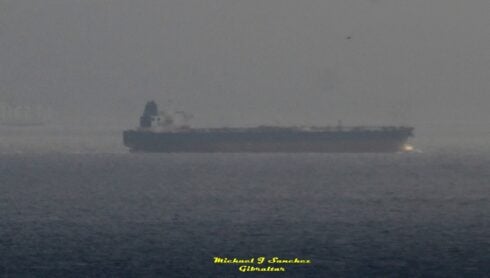GIBRALTAR has been slammed for taking “grave environmental risks” by failing to control oil tankers in its waters.
In the week that the BP oil leak became the worst environmental disaster in US history, the Andalucian Public Prosecutors office singled out the enclave for breaking international maritime rules on the so-called practice of ‘bunkering’.
In its annual report on the region’s environment, it urges tighter “controls” over oil tankers in its waters.
It claims that Gibraltar is allowing tankers that “don’t comply with international maritime law or safety” to enter its waters.
And it adds that the Rock’s lax attitude to bunkering – the refuelling of tankers at sea – is leading to serious environmental dangers.
According to the report, the authorities are breaking EU and international rules in the way these tankers are being allowed to transfer combustible fuels.
“This lack of control is making it difficult to enforce punishments for oil leaks,” insists the report.
“It means the perpetrators of spills are impossible to penalise.”
The rap comes after a couple of serious accidents in the bay over recent years. The first saw tanker New Flame sink after a collision and the second involved Fedra, which left a long slick after it crashed in bad weather.
“It’s a very risky situation and if anything were to go wrong it could lead to a catastrophic spill.”
Last year the European Maritime Safety Agency, an EU body, confirmed that the bay was at risk from “occasional significant accidents.”
The PP party has now raised the report in Madrid, while Greenpeace has long campaigned on the issue.
Last year the pressure group joined a forum demanding that both the Spanish and Gibraltarian authorities took urgent measures to protect the bay.
Various environmental groups insist that the authorities are risking a “catastrophic” leak that could destroy the environment.
A Greenpeace report said the bay was suffering from “chronic pollution” due to hydrocarbons, ‘not only as a result of accidents, but also as a consequence of regular unballast, ship-to-ship bunkering’.
Greenpeace campaigner, Sara de Rio, told the Olive Press: “It’s a very risky situation and if anything were to go wrong it could lead to a catastrophic spill.
“There is key sea life in the waters and the Gibraltar, as well as Spanish authorities should do more to protect it.”
A local environmental source in Gibraltar agreed: “This is an environmental disaster waiting to happen.
“The Gibraltar officials should ignore their responsibilities at their peril. Our organisation has been lobbying Gibraltar to monitor its bunkering business for a number of years now.
“Incredibly, people are talking about actually increasing the amount of bunkering going on because it is highly profitable, but it has to be regulated.”
But she added that Spain should also shoulder a fair amount of the blame.
“To be fair the Andalucian authorities seem to be throwing mud and ignoring their own responsibilities.
“It makes it very churlish to criticise Gibraltar when Spanish industry along the coast is discharging raw sewage into the sea.”
Click here to read more News from The Olive Press.






It’s nice to see some criticism about Gibraltar. Specially from a newspaper directed mostly to British expatriates in Southern Spain who enjoy of all sort of benefits of our country but wouldn’t say a word against Gibraltar colonial status. Someone should start confronting them with the fact that their wonderland colony isn’t actually so.
I am opposed to bunkering myself, but as a Gibraltarian I find it predictable that Spanish politicians can accuse Gibraltar of lax environmental standards when in recent days we have all seen the ghastly pall of smoke emanating from the refinery and associated industries and the port of Algeciras, wafting across the Strait and enveloping its Southern shore. Bunkering vessels themselves ‘fill up’ from the refinery and some Algeciras based vessels have even been permitted to bunker to vessels within Gibraltar Port waters, which I find scandalous.
The environment agency in Gib has previously found more problem with pollution from cars driving around in Gib than anything floating over from the refinery; that is not to say that the refinery shouldn’t clean up its act.Is the Gibraltar government prioritising this problem & its effects in its transport plan?
http://www.gibraltar.gov.gi/images/stories/PDF/transport/Integrated%20Traffic,%20Parking%20and%20Transport%20Plan%20(Including%20Implementation%20Checklist)%20APRIL%202010.pdf
Instead of tit-for-tat recriminations, people can choose to campaign for the benefit of all regardless of nationality for which pollution, destuction of the environment & ill health has no preference. How about more carparks in La Linea & a park & ride system for Gibraltar? Charlie
I thought the OP was good at investigative journalism. Sadly this article is an example of the opposite.
Spain is not just discharging raw sewage into the sea. It’s much worse than that. Let’s have some facts and figures OP!
How much fuel is bunkered out of Algeciras for example? And how much of that is bunkered ship-to-ship (then we’ll really know who has a “lax attitude”). How many Algeciras based bunker barges are single-hulled? That’s before we even start with the bunkering activities out of Ceuta.
The irony is the vast majority of fuel oil out of Gibraltar comes from the CEPSA refinery in Los Barrios anyway and what people don’t realise is that Gibraltar is more or less at maximum capacity now but bunkering out of Algeciras is growing every year.
There is pollution happening on both sides of the bay, that’s a fact.
OP get your facts right before quoting preposterous statements – Gibraltar is allowing tankers that “don’t comply with international maritime law or safety” to enter its waters.
By inference If this where true (which it is not) why would it be ok for these tankers to sail everywhere but not in Gib waters!!
Justin, you ask for facts: We put some in a separate fact box in the main paper. “In Gibraltar 4.3 million tonnes of bunkered oil was delivered in 2007 and bunkering is said to be the ports main activity. It is the second biggest bunker market in Europe after Amsterdam, Rotterdam, Antwerp. Of 8,351 vessels which called at Gib in 2007, 5,640 were fuelled in this way. The figures in Algeciras are much smaller in comparison. We were also told by a reliable source that Gib is looking to increase these figures too.”
We don’t doubt and have reported many times on the Spanish coastal abuses regarding pollution and Cepsa is easily one of the worst polluters… but on this occasion it was Gib criticised.
Tom F… We are not saying that… it is reporting directly from the prosecutors report
Editor
I know you were simply reporting what was in the report, but there is nothing in the figures above or in the original article to back up the claims that Gibraltar is “lax” with regard to bunkering. Less still to back up the claim that Gibraltar is breaking international or EU law. The report smacks of nothing more than a Spanish institution taking another pop at Gibraltar for political reasons. I wish the OP would at least offer the relevant Gibraltarian authority the opportunity to comment.
Spain bunkers off Algeciras and Ceuta. Spain has a rotting refinery well past its sell-by date in the same bay. Greenpeace Sara should think more in terms of green and les in terms of red and yellow.